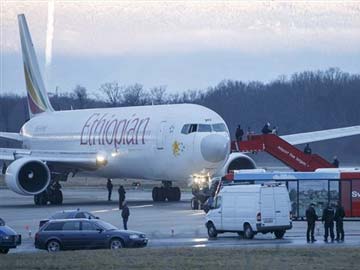
The plane landed safely, and none of the 202 passengers and crew members on Flight ET-702, which originated in Addis Ababa, the Ethiopian capital, were injured, said the police spokesman, Eric Grandjean.
‘Everybody was safe from beginning to end – no problem,’ he added.
Other officials said passengers were unaware of the hijacking until the plane landed in Switzerland.
The plane was in Italian airspace when the co-pilot, whom the Ethiopian government identified as Hailemedhin Abera Tegegn, a 31-year-old Ethiopian national, took the controls after the pilot left the cockpit to use the restroom. After locking the cockpit door, he initially told Italian air controllers that he needed fuel, but then activated a transponder to signal that the plane was being hijacked, Grandjean said. Italian fighter jets were scrambled, and they escorted the aircraft out of Italian airspace.
The plane landed in Geneva at 6:02 a.m. and continued to a taxiway, where the co-pilot turned off the engines, opened the cockpit window and lowered himself to the tarmac with a rope, officials said. He then ran toward security officers and identified himself as the hijacker, declared that he was in danger in Ethiopia and requested asylum, the officials added.
At a news conference in Addis Ababa, the Ethiopian minister of information, Redwan Hussein, said Hailemedhin had no criminal issues that would have made him fear prosecution.
‘Any political, social reason would not make sense to hijack a plane,’ he said, adding, ‘So far, it is known that he was medically sane until otherwise is proven through the investigation.’
Redwan also said that as an Ethiopian citizen, Hailemedhin was free to leave the country at any time.
A Geneva prosecutor, Olivier Jornot, said the co-pilot would be charged with taking hostages, a crime punishable by up to 20 years in prison, The Associated Press reported. He added that the man’s chances of winning asylum were slim.
‘Technically, there is no connection between asylum and the fact he committed a crime to come here,’ he said, according to The AP. ‘But I think his chances are not very high.’
Redwan said there was no bilateral agreement for extradition between Ethiopia and Switzerland.
Ethiopian Airlines, confirmed in a statement on its website that all passengers aboard the flight were safe and said it was making arrangements for them to continue to their destinations.
Hijackings of civilian aircraft by crew members are relatively rare. In 1986, Wang Xijue, a pilot for China Airlines of Taiwan, overpowered his two co-pilots on a cargo flight en route to Bangkok from Taipei. Wang then diverted the plane, which was not carrying passengers, to Guangzhou, in mainland China, where he defected.
In 1953, Mira Slovak, a pilot for Czechoslovak Airlines, locked his co-pilot out of the cockpit shortly after takeoff of a flight to Brno from Prague carrying 25 passengers. Slovak changed course for West Germany, landed the plane safely in Frankfurt and requested political asylum. Slovak, now 84, made his way to the United States, where he became a celebrated speedboat racer and a pilot for Continental Airlines.
In 2000, a Saudi Arabian Airlines flight to London from Jiddah was hijacked by two airport guards, both Saudi citizens, who forced the pilots to divert the plane to Baghdad.
